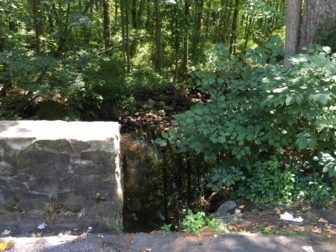Prompted by what one complainant is calling health and safety concerns, the municipal officials responsible for overseeing New Canaan’s wetlands are investigating whether the town has jurisdiction over pesticide and landscaping trucks that draw water from rivers here.

Pesticide and landscaping trucks regularly draw water from this bridge over the Noroton River at Frogtown Road. Credit: Michael Dinan
Brought to the Inland Wetlands Commission’s attention by an attorney who cited a property that backs up to the Noroton River, concerns include traffic safety and the potential for backflow of chemicals into the river itself, commissioners say.
Angela Jameson, secretary of the commission, said that officials also have looked into whether private property issues are at stake, since the trucks that draw water from the Noroton River—as well as Mariomi River—may sometimes need to cross part of a residential parcel in order to do so.
One open question facing the commission is whether Inland Wetlands itself “has any kind of jurisdiction” with respect to trucks that draw water from rivers in New Canaan, Jameson said.
“Based on our legal advice and our own reading of the regulations, it seemed to us that this was not covered by the Inland Wetlands Regulations of the town, but we could understand why neighbors in the Frogtown Road area were concerned about what was going on and the risk of pollution, and the fact that a precious natural resource was being taken for free and no one was paying for it,” she said. “It seemed to us that there wasn’t really any body or agency in town that had oversight of this.”
In fact, as best the commission and Inland Wetlands director Kathy Holland can tell, jurisdiction appears to fall exclusively under the state Department of Energy and Environmental Protection.
Under state law: “The [DEEP] commissioner shall have exclusive authority in the regulation of pesticide spraying, including, but not limited to, practices and procedures prior to and during any spraying, except as provided in section 22a-66z,” which references the commissioner of Public Health. “The commissioner may by regulations adopted in accordance with the provisions of chapter 54 establish procedures for municipalities to designate watercourses or other sources of water which applicators may draw upon for pesticide spraying.”
The commission has discussed the issue multiple times in the past year, after it first received inquiries about the practice from attorney Ed Mellick, a longtime New Canaanite speaking on behalf of a relative who lives downstream from the Frogtown Road bridge where trucks draw water.
Specifically, Mellick asked whether the drawing of that water should be a regulated activity that’s monitored, permitted or otherwise overseen by town government.
Holland found that area towns such as Darien, Greenwich, Norwalk, Stamford and Wilton have weighed the prospect of passing a local ordinance or other measure, but have not done so. Westport does have its own longstanding “tree spraying ordinance,” overseen by that town’s tree warden, where those using designated ponds and streams need a permit. In Westport, a municipal employee does inspect trucks, according to Holland.
Yet it isn’t clear, given the state law, whether Westport has the authority to put its own ordinance into practice, officials said.
The head of environmental affairs in Wilton told Holland that he had raised concerns about the practice several years ago.
“I learned that the trucks are equipped with a backflow preventer valve which allows them to suck clean water from the Norwalk River without the possibility of mixing with the chemical treated water in the tank and flowing back into the river,” Mike Conklin told Holland, according to her staff report. “If they didn’t have this backflow preventer their entire system would act like a siphon and when they turned off the pump the water would rush from the truck back into the river.”
One idea that emerged from the commission at a recent meeting is the possibility of designating a hydrant in New Canaan specifically for use by pesticide and landscaping trucks. Hydrants in New Canaan are not owned by the town, but by Aquarion, according to Holland.
To her inquiry about a designated hydrant, the water company’s manager of environmental protection said Aquarion “immediately recognized the environmental benefits of such a hydrant and why the town would want to establish one,” according to Holland’s staff report.
“As we talked, however, we realized that because the hydrant would be used in association with pesticides, there would be other, less routine considerations to address. These include backflow prevention, spill [and] secondary containment, and possibly the need for regulatory approval.”
Residents should be as concerned about the pesticides sprayed into their air, as they are about what is going into their rivers. All of those herbicides and pesticides dumped on the greener than green lawns eventually make their way into ground water. Do you want to be drinking that just to have a green, weed free lawn? As a former long time resident of New CanaanI witnessed many trucks are drawing from our water sources. (At least the swimming pool companies had only empty tanks and didnt release chlorine.) And worse, I had seen more than once, panel trucks belonging to painting contractors pulling to the side of the road near water sources. Dumping waste? Regulation would be a good step and education about the indiscriminate use of herbicides and pesticides should be ongoing.
Agree. It’s terrible so many people are spraying chemicals on their lawns that go directly into their drinking water. god only knows what the long term effects of ingesting these toxins are on our bodies and more importantly our children.